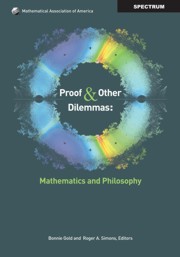Book contents
- Frontmatter
- Contents
- Acknowledgments
- Introduction
- I Proof and How it is Changing
- II Social Constructivist Views of Mathematics
- III The Nature of Mathematical Objects and Mathematical Knowledge
- IV The Nature of Mathematics and its Applications
- 12 Extreme Science: Mathematics as the Science of Relations as Such
- 13 What is Mathematics? A Pedagogical Answer to a Philosophical Question
- 14 What Will Count as Mathematics in 2100?
- 15 Mathematics Applied: The Case of Addition
- 16 Probability—A Philosophical Overview
- Glossary of Common Philosophical Terms
- About the Editors
14 - What Will Count as Mathematics in 2100?
from IV - The Nature of Mathematics and its Applications
- Frontmatter
- Contents
- Acknowledgments
- Introduction
- I Proof and How it is Changing
- II Social Constructivist Views of Mathematics
- III The Nature of Mathematical Objects and Mathematical Knowledge
- IV The Nature of Mathematics and its Applications
- 12 Extreme Science: Mathematics as the Science of Relations as Such
- 13 What is Mathematics? A Pedagogical Answer to a Philosophical Question
- 14 What Will Count as Mathematics in 2100?
- 15 Mathematics Applied: The Case of Addition
- 16 Probability—A Philosophical Overview
- Glossary of Common Philosophical Terms
- About the Editors
Summary
From the Editors
In this chapter, Keith Devlin examines how our concept of mathematics has changed over the centuries and suggests a direction it may grow over this next century. He anticipates the focus of mathematics continuing to shift from science and engineering towards the humanities and social sciences. As a result, students who are more people-oriented may be increasingly attracted to mathematics. Of course, as our idea of mathematics changes, our approach to mathematics courses will have to change correspondingly.
Keith Devlin is a scholar with broad interests, and a penchant for trying to communicate mathematics to a broad audience. He is a Senior Researcher at, and Executive Director of, the Center for the Study of Language and Information, as well as a Consulting Professor of Mathematics at Stanford University (www.stanford.edu/~kdevlin/). He is a co-founder of the Stanford Media X research network, which provides an industry portal to Stanford departments and centers which study people and technology—from engineering and computer science to psychology, linguistics, education, and art. He is also a co-founder of the university's H-STAR (Human Sciences and Technology Advanced Research) institute (a new Stanford interdisciplinary research center focusing on people and technology—how people use technology, how to better design technology to make it more usable, how technology affects people's lives, and the innovative use of technologies). He is a World Economic Forum Fellow and a Fellow of the American Association for the Advancement of Science. His current research is focused on the use of different media to teach and communicate mathematics to diverse audiences. He also works on the design of information/reasoning systems for intelligence analysis.
- Type
- Chapter
- Information
- Proof and Other DilemmasMathematics and Philosophy, pp. 291 - 312Publisher: Mathematical Association of AmericaPrint publication year: 2008

